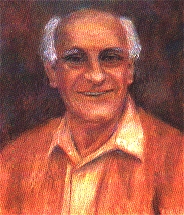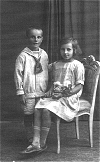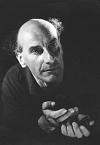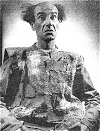
Adam Mularczyk
|
Adam Mularczyk was born in Krakow on January 13, 1923 and
was born to be in the theatre. His parents firmly believed in that; his
friends talked about that and his professional colleagues and peers resigned
themselves to and accepted that fact. An ancestral source for this talent
was never identified. Adam was truly the first in his family to have the
theatre in his blood. His first steps on "stage planks" were as a six-year-old
under the family dining room table. On this small stage with a curtain
sewn by his mother, the little artist, full of creative energy and even
then, a touch despotic, played two and three different roles, changed costumes,
and did his own makeup with watercolors and glued a mustache made of corn
husks onto his face. He tirelessly danced and entertained his audience
who rewarded him with heartfelt applause. |
Adam grew and so did his theatric ambitions. When he reached
age of 13, his dreams were realized in the form of the theatrical school
under the name Jadwiga Smosarska, an actress whose movies he adored. His
diary from that theatre was hidden and protected during the war and survives
until this day. Even during childhood, Adam was a collector and archivist.
On a true theatrical stage, 13 yr. old Adam first performed in the
Slowacki theatre in Krakow, where together with the Krakow children's choir
he appeared in Bizet's opera Carmen. This was a great experience for him.
He would not appear again on that stage until 29 years later when he came
back to Krakow as an actor in the National Theatre for a guest appearance
in the plays "Historyja o Chwalebnym Zmartwychwstaniu" and "Zywot Jozefa". |

Adam and his sister Marysia
|
On a true theatrical stage, 13 yr. old Adam first performed in the Slowacki
theatre in Krakow, where together with the Krakow children's choir he appeared
in Bizet's opera Carmen. This was a great experience for him. He would
not appear again on that stage until 29 years later when he came back to
Krakow as an actor in the National Theatre for a guest appearance in the
plays "Historyja o Chwalebnym Zmartwychwstaniu" and "Zywot Jozefa".
After that came the war and the dark and difficult years of occupation.
The situation for Polish youth especially students was difficult and dangerous.
Adam was raised with a deep sense of patriotism. There was no uncertainty
about who the enemy was and, having since childhood an "all or nothing"
personality, he rushed to join the Polish underground with the help of
his scouting contacts. His unextinguishable passion for the theatre and
his plan to organize his own theatre nurtured him even more even
though all demonstrations of Polish patriotism were forbidden and harshly
punished.
Already in 1940, a 17 year old Adam assembled a group of 94 people,
young, curious and hungry for the theatre as he was himself. Without professional
training, Adam through sheer instinct sorted the members of his group according
to their talents as actors, scenographers, musicians, machinists, dancers,
make up artists and administrators. With this group under the name of the
Krakow Underground Theatre, theatrical preparation was begun under the
very noses of the German Occupation and the harsh rule of Governor Frank.
This was a task that was neither easy nor safe.
Despite growing hardships, Adam's Krakow Underground Theatre from 1940
to 1945 prepared eight premieres and at secret locations gave 16 performances
that were seen by around 2000 people. The plays were "Podejrzana Osoba"
by Dobrzanski, "Kozlowickie Sherlocki Holmesy" by Piatkowski (Pobratymiec),
"Wesele" by Wyspianski, "Werbel Domowy" by Gregorowicz, "Zemsta" by Fredro,
"Trojka Hultajska" by Nestroy, "Niespodzianka " by Rostworowski, "Bo Gdy
Harmonia Gra" and "Smiech to Zdrowie ".
When working on these productions, Adam benefited from the professional
help of some of Krakow's most experienced theatrical icons like Wieslaw
Gorecki, Wiktor Bujanski, Tadeusz Kudlinski who later after July of 1945
along with Mayerhold, J. Zielinski and J. Merunowicz taught courses on
theatre in Krakow.
One of the guests at rehearsals was Karol Wojtyla who was three years
older than Adam and was then an actor in his own rite in the Underground
Rhapsodic Theatre of Krakow. Among the young members of the Krakow Underground
Theatre could be found names of people who were later pillars of the Polish
stage and screen, Halina Mikolajska, Halina Romanowska, Krystyna Pachonska,
Irena Stelmach, Irena Wilkoszewska, Marian Cebulski, Stanislaw Zaczyk,
Marian Friedman, Jerzy Passendorfer, and Jerzy Twardowski.
The Krakow Underground Theatre founded by Adam Mularczyk went down to
the history of Polish Theatre. In 1945, Adam and the majority of his actors
were accepted to study in the recently opened "Teatr Stary Studio" in Krakow.
This group was organized by Ronard Bujanski and led by accomplished pedagogical
actors. After completing examinations, Adam was accepted into the membership
ranks of the "Union of Artists of the Polish Stage" which provided him
the credentials of a professional actor. In 1947, Adam added his Krakow
Underground Theatre to this organization thereby extending professional
actor status to the members of the Krakow group.
As a professional actor, Adam's debut performance was witnessed by some
of the stars of the Polish stage, Juliusz Osterwa, Maria Duleba and Janusz
Warnecki. From 1945 to 1946, he acted in the "Teatr Stary" in Rostworowski's
"Niespodzianka", Zawiejski's "Maslaw, de Peyret-Chappuis' "Nieboszczyk
pan Pic", Hocker and Post's "Krol Wloczegow", Garaul's "Zlota Ciocia",
J. Anouilh's "Pasazer bez bagazu" and Marivaux's "Igraszki Trafu i Milosci".

Paris 1964
|
In 1947, along with his mentor Janusz Wamecki, Adam came
to Warsaw to the "Teatr Muzyczny Domu Wojska Polskiego". Here under the
direction of J. Tuwim and J. Warnecki he played in Dobrzanski's "Zolnierz
Krolowej Madagaskaru" adapted by Tuwim. Here, Adam played alongside great
actors such as Mira Ziminska and Ludwik Sempolinski. This performance was
a huge success.
In this same year, Adam became involved in the New Theatre organized
by Tuwim and Meller, where in the course of 7 years he performed in many
plays such as Beaumarchais' "Wesele Figara", Balucki's "Dom Otwarty", Labiche's
"Slomkowy Kapelusz", de Molin's "Zielony Gil", Gogol's |
"Rewizor", Shakespeare's "Sen Nocy Letniej", Fredro's "Damy i Huzary",
Domanski's "Milionowe Jajko" and Dunajewski's "Swobodny Wiatr".
In this same year, Adam became involved in the New Theatre organized
by Tuwim and Meller, where in the course of 7 years he performed in many
plays such as Beaumarchais' "Wesele Figara", Balucki's "Dom Otwarty", Labiche's
"Slomkowy Kapelusz", de Molin's "Zielony Gil", Gogol's "Rewizor", Shakespeare's
"Sen Nocy Letniej", Fredro's "Damy i Huzary", Domanski's "Milionowe Jajko"
and Dunajewski's "Swobodny Wiatr".
In 1954, when the New Theatre became transformed into an opereta company,
Adam moved on to the National Theatre in Warsaw where he worked until 1973
under the sequential directorship of B. Korzeniewski, W. Horzyca, K. Dejmek
and A. Hanuszkiewicz.
| This period gave rise to some of Adam's greatest performances.
Chudogeba in "Wieczor Trzech Kroli" by Shakespeare, Bazylio in "Wesele
Figara" by Beaumarchais, Prologus, Judasz i Jandras in "Historyja o Chwalebnym
Zmartwychwstaniu Panskim " by Mikolaj of Wilkowiecko. He also performed
in "Henryk VI na Lowach" by Boguslawski, "Opera za Trzy Grosze"
by Brecht, "Niedzwiedz" by Chekov , "Ksiaze Homburgu" by Kleist, "Slowo
o Jakubie Szeli" by Jasienski, "Zywot Jozefa" by Rej, "Dziady " by Mickiewicz,,
"Kordian" by Slowacki, "Muchy" by Sartre and in "Ciezkie Czasy" by Balucki. |

A Midsummer Night's Dream
|
In 1957, Adam made a theatrical guest appearance reprising his famous and
unforgettable role of "Lucky" in Samuel Beckett's "Waiting for Godot" under
the direction of J. Kreczmar. This was an extraordinary creation
and a huge performance.
In 1973, Adam, not receiving satisfactory roles under the director Hanuszkiewicz,
moved from the National Theatre to the Polish Theatre in Warsaw, where
under the direction of A. Kowalczyk played in Shakespeare's "Jak sie wam
podoba", Wiszniewski's "Tragedia Optymistycna",and in "Podporucznik Kize"
a comedy by Fedecki and Jarocki. Also in the Polish Theatre, he played
in "Osielek Porfironi" by Galczynski and created an unforgettable character
of Kola Brynion in "Leki Poranne" by S. Grochowiak.

Photo album
|
Adam also acted in several films and television spectacles.
Some of these films brought him enormous popularity, among them "Godziny
Nadziei", "Krol Macius I", "Poszukiwany, poszukiwana", "Tysiac Talarow",
"Pieczone Golabki", and "Nie Lubie Poniedzialku". These films are
still shown on Polish television today. Adam very much enjoyed his
work in film, being drawn to its technical and dynamic workings and its
boundless possibilities. However, his uncompromising political attitude
during those years limited his appearances in film despite his enormous
popularity. |
Adam took part in several serials and other shows on Polish radio.
His unforgettable role of Professor Peduszko in "Radiowy Teatrzyk Eterek"
by Jeremi Przybora i Jerzy Wasowski won him a huge popularity. This
progam ruled the air waves for over 10 years and when the series was finally
over, the audience, the actors and Adam himself felt orphaned. Still
today, Polish radio replays this series.
Beyond his very active professional work on stage, film, radio and television,
Adam's hobby was his theatrical work with amateurs. Much time and
effort was invested in working on the gestures and rhetoric of the clerics,
students of the Metropolitan Seminary and Pauline order in Warsaw.
During the course of 11 years, he trained over 350 students. One of his
students was Father Jerzy Popieluszko.
Adam organized a student theatre in the Academy of Catholic Theology
in Warsaw and theatre in St. Augustine's High School.
Some of his other hobbies centered on his love of the Tatra Mountains
and their inhabitants, the gorale. He adored cars, or as he called
them "motorized machines". He was a passionate archivist, chronicling
his times by way of his photographic memory.
In 1973, Adam left Poland with his family to settle in the USA in the
City of Philadelphia where he started the Polish Dramatical Theatre that
was housed at the Associated Polish Home. He never returned to Poland.
He died in Philadelphia on June 12th, 1996. His ashes reside at the
Cemetery of Our Lady of Czestochowa in Doylestown. In keeping with
his wishes, in 1996 a scholarship fund was initiated in the name of Adam
Mularczyk for the best student in the actors division of the Theatrical
Academy in Warsaw. |


